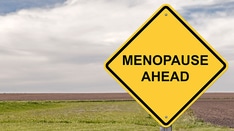Hormone therapy (HT) in newly menopausal women mitigates vasomotor symptoms, including hot flushes, and improves some markers of cardiovascular disease (CVD), according to the Kronos Early Estrogen Prevention Study (KEEPS). However, HT has no effect on the progression of atherosclerosis, researchers report in an article published online July 28 in the Annals of Internal Medicine.
"The cloud has a silver lining, but we were disappointed because earlier research, especially by Howard Hodis, saw a deceleration in atherosclerosis progression with estrogen," said lead investigator S. Mitchell Harman, MD, PhD, endocrinologist, Phoenix Veterans Affairs Care System, Arizona.
The 4-year, 9-center randomized placebo-controlled trial studied 727 healthy women, aged 42 to 58 years (mean, 52.7 years), who were at low risk for CVD and were within 0.5 to 3.0 years (mean, 1.4 years) of their last menses.
The primary aim was to assess, via noninvasive vascular imaging, the effect on atherosclerosis progression of early initiation of a 4-year regimen of low-dose HT with either oral conjugated equine estrogens or transdermal 17β-estradiol, plus oral micronized progesterone, vs placebo. It is the largest of the few head-to-head trials to do this.
However, imaging at baseline and 4 years showed HT had no effect on atherosclerosis progression. Compared with placebo, however, it improved CVD factors such as lipid profile and insulin resistance, as well as vasomotor symptoms.
"This study provides important information for clinicians," KEEPS investigator JoAnn E. Manson, MD, DrPH, professor of medicine, Harvard University, Boston, Massachusetts, told Medscape Medical News. "Hormone therapy initiated early in menopause appears to have a favorable balance of risks and benefits with a substantial improvement in vasomotor symptoms and quality of life and improvement in a number of biomarkers."
Therapy type affected different markers, with oral estrogen improving cholesterol and transdermal estrogen improving insulin sensitivity. "That would suggest that for a woman who has risk factors for diabetes and metabolic syndrome, transdermal might be a better choice than oral," Dr. Manson said.
Because oral estrogen has been found to have a prothrombotic effect, transdermal delivery may also be better for women with existing risk CVD risk factors.
No effect on blood pressure was noted with the low-dose KEEPS regimens, in contrast to the Women's Health Initiative in 2002, which showed modest increases in systolic blood pressure with higher-dose therapy in older women.
Dr. Manson cautioned that KEEPS lacks the power to provide conclusive evidence on long-term adverse clinical events such as stroke, thromboembolism, myocardial infarction, breast cancer, and all-cause morality. "But given that caveat, I don't think we need to stop using hormone therapy in appropriate candidates until we have larger trial."
Atherosclerosis Progression
The primary outcome was annual change in carotid artery intima-media thickness, as assessed by blinded ultrasound readers. Coronary artery calcium was assessed by blinded computed tomography readers. Mean carotid artery intima-media thickness increases of 0.007 mm/year were similar across all groups, and there was no significant difference in the percentages of participants in whom coronary artery calcium score increased.
Secondary endpoints included changes in markers of CVD risk. No changes in blood pressure were observed. Insulin resistance decreased with transdermal estrogen, whereas oral estrogen improved both low- and high-lipoprotein cholesterol levels. Oral therapy also increased levels of CVD markers such as C-reactive protein and sex-hormone-binding globulin, but not interleukin 6.
Adverse events such as rashes, fractures, headaches, and genitourinary problems were similar in all 3 groups, whereas vaginal bleeding was significantly more common in the treated groups.
The authors concede that in referencing a population of healthy younger menopausal women, KEEPS results might not be generalizable to women at greater CVD risk, and that higher doses of estrogen might have a greater effect on endothelial health.
"To the extent that these imaging methods predict CVD events, our findings suggest that HT neither is a risk nor is protective in the population studied," the authors write. Noting that the long-term effects of low-dose HT remain uncertain, they call for further studies to clarify the relevance of the 2 estrogen routes to CVD pathogenesis.
The primary funding source for this study was a grant from the Aurora Foundation to the Kronos Longevity Research Institute, Phoenix. Dr. Manson has no connections to any of the 3 pharmaceutical companies that supplied drugs for the KEEPS trial. Dr. Harman has disclosed no relevant financial relationships.
Ann Intern Med. Published online July 28, 2014. Abstract
Medscape Medical News © 2014 WebMD, LLC
Send comments and news tips to news@medscape.net.
Cite this: Menopause: Hormone Therapy Does Not Slow Atherosclerosis - Medscape - Jul 30, 2014.











Comments